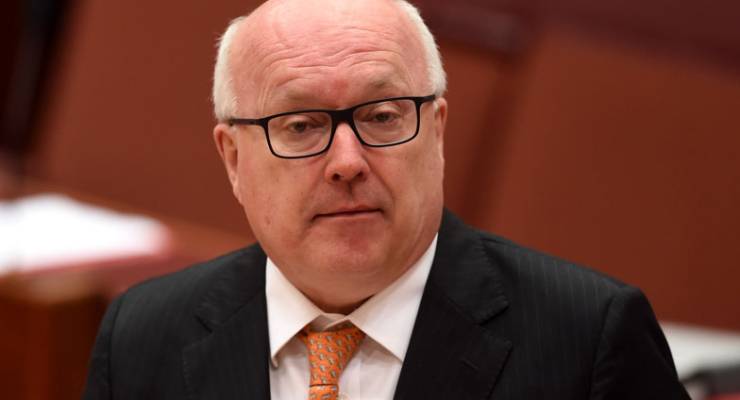
The ho-hum response to ASIO’s admission that it has been pursuing journalists’ sources under Attorney-General George Brandis’ new metadata laws points to a deeper malaise. That only a “small” number of journalist information warrants have been obtained, according to ASIO boss Duncan Lewis, is neither here nor there.
That any have been granted is a matter of public importance — and not just for journalists, but to anyone who cares about press freedom and the role of the media in democracy.
Australians are easily outraged by Donald Trump’s latest brain outage. Less so, it seems, by the fact our domestic spy agency is breaking down the confidentiality of journalists’ sources — by only seeking permission of the Attorney-General.
Publishers and journalists are not asked or told what is happening. They can’t object to their data being sought and used to identify whistleblowers.
ASIO is not the only agency that can discover sources of information armed with these new warrants. Introduced in late 2015 via amendments to the Telecommunications (Interceptions and Access) Act 1979, these new data retention laws give 21 government agencies the power to seek information about journalists’ sources — all without the hacks or their employers knowing about it.
Those agencies, of course, do have to apply to a Federal Court judge for a warrant. But ASIO is special; it only needs to ask George Brandis for the nod.
As Crikey’s Bernard Keane writes, it would be really helpful — and not unreasonable — to know if Brandis had complied with the requirement to let the Parliament’s intelligence committee know a warrant has been issued.
[Did Brandis breach his own ‘journalist information warrant’ law?]
Is revealing that due process was followed a state secret? Surely it is just letting the world know you are doing your job. Does the attorney-general have a right to be silent on such matters?
The only official friend of the journalist — and their whistleblowers — in cases of these new warrants is the public interest advocate (PIA). There are two of them, both retired judges. They have been named, after a freedom of information request by Fairfax Media, as Kevin Duggan and John Muir.
The PIAs were a last-minute concession as the amended act passed Parliament with bipartisan support. They are meant to make arguments about whether the disclosure of the journalist’s source outweighs the public interest in protecting source confidentiality.
But as far as I can make out, the PIAs are pretty well MIA.
They can’t talk to their “clients” about what they are doing, let alone let the public know. We simply don’t know how the PIAs are faring.
Just how busy are they knocking back requests to reveal the sources of journalist? Would the words “small number” again be applied?
We do know the first two PIAs had no experience in media law or journalism.
Maybe they just need a bit of time to settle in the jobs.
The trouble is, we simply don’t know what is going on — and no one in the federal government appears compelled or inclined to let us know.
This is part of the greater malaise — a malaise that will only end, if it can, if journalists, publishers and their audiences start worrying about the gradual erosion of our democratic freedoms. It is one thing to worry about the Twitter feed rantings of Donald Trump. He is not running our country.
It is incumbent on journalists and anyone interested in freedom of speech to talk about these restrictions as much as possible — and to explore ways of monitoring their impact on public discourse.
Armed with public support and trust, both things admittedly a bit in short supply, journalists stand a greater chance of overturning restrictions on freedom of speech — or beating off new ones. In the absence of more robust shield laws for source protection, having the public on side might be the journalists’ best bet.
*Peter Fray writes an irregular media column for Crikey.







Hey, I gotta rilly, rilly simple idea. The meeja, legacy Press, radio, TV, colour mags should just go on strike and refuse to attend pressers, or accept any briefings, ‘friendly leaks’ or wannabe Deep Lips.
Just go for scuttlebutt, grievance mongers, loonies, loopies and thise wh think in green ink.
If a fortnight of that sort of reportage hasn’t brought down a government & excoriated HM’s Loyal Opposition they need another week or ten.
What’s the old saw, revolution is only 3 missed meals away?
I believethat the identity of the very brave whistleblowers should be protected but the fact is that these days, especially after the Rupert Murdoch’s News Limited behaviour in the U.K., fake news, the fact that some journalist/reporters don’t seem to be just reporting the news per se, they are skewing it to whichever way their masters demand. People have just stopped blindly trusting both governments and media to tell us the truth or to report news without adjusting it. I myself used to admire “newspaper” men but these days, I have to decide who I can trust, who I think is reporting the news honestly and thank goodness there are still serious journalists I can trust and believe in (I hope!!!!!).